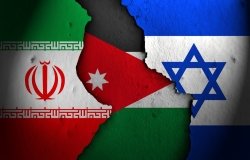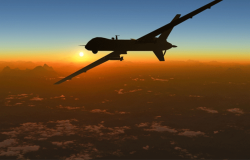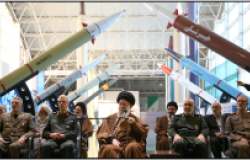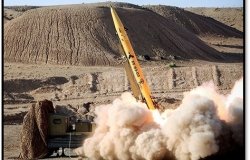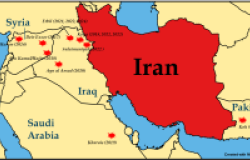An Unnecessary Crisis
Henri Barkey gives some possible reasons behind this week’s high-stakes standoff between Recep Tayyip Erdogan and Vladimir Putin.
Turkey’s NATO allies have by and large stood by Ankara in the wake of Turkey’s downing of a Russian Su-24 bomber this past Tuesday. As President Obama has argued, every country has the right to defend itself. The Turks and the Russians have been on opposing sides of the Syrian civil war, with Moscow intervening to bolster the fragile regime of strongman Bashar al-Assad and Ankara almost from the beginning supporting a slew of armed opposition groups wanting to overthrow Assad.
The differences over Syria notwithstanding, however, there are a number of open questions about this story. The first is the violation of the Turkish airspace itself. Allegedly, the Russian bomber, which was presumably loitering while waiting for target coordinates, spent a total of 17 seconds in Turkish territory. Prior to shooting it down, the Turks tried to radio the Russian aircraft ten times in the space of five minutes, to no avail.
In other words, this was not a case of self-defense but rather one of defending one’s sovereignty.
Still it seems hard to believe that such a minor violation would merit a shootdown, even if, as the Turkish side claims, there had been similar violations earlier. The irony is that then-Turkish Prime Minister, and now President, Recep Tayyip Erdogan had bitterly complained in 2012 when the Syrians shot down a Turkish air force jet that had allegedly strayed into Syrian airspace. At the time he pointedly argued that “a short-term border violation can never be a pretext for an attack.” How was the situation different in the Russian case? Besides, Turkish and Greek aircraft routinely violate each other’s space; neither side would even think of shooting down the other’s aircraft.
Second, Obama’s articulation of Turkey’s “right to defend itself” does not really apply in this case. Russia and Turkey are two friendly countries that have extensive trade, tourism, and other ties. Russian President Vladimir Putin and Erdogan had vowed to raise the trade volume to $100 billion by 2023. Turkey buys large amounts of gas from Russia. They are both dependent on that trade; Turkey consumes large amounts of energy, and the Russians need the foreign exchange earnings this trade provides. Hence an armed bomber on the fringes of Turkish territory is an unlikely threat to any country, much less an important member of NATO. Why would Turkey feel threatened by that single aircraft? Why would the Russians, who are already saddled with numerous other problems, threaten a friendly country? In other words, this was not a case of self-defense but rather one of defending one’s sovereignty.
So why did Turkey shoot the plane down? There are two possible explanations, though neither is completely satisfying. The first is that the Turkish F-16s were given rules of engagement that required them to engage any aircraft that penetrated Turkish airspace, especially if the opposing craft failed to respond to emergency communication requests. The policy may have been put in place precisely because the Russians appeared to regularly violate Turkish airspace. Yet this is far too important a decision to be left to individual pilots or perhaps even their ground controllers. Attacking a Russian plane entails a risk of engulfing the NATO alliance in a confrontation that it may not be seeking. NATO predictably supported Turkey, just as it had done in 2012 when the roles were reversed.
The second explanation is that this was a deliberate act by Turkey. Ankara had been ready for any intrusion of its airspace, having made up its mind in advance of this particular incident. In this scenario, given the five minutes spent trying to radio the Russian jet, the Turkish military had ample time to consult with their political bosses; this is not a decision the Turkish General Staff would have taken on its own without civilian prodding. Given the high stakes involved, what would encourage the Turkish leadership to take such risks?
The Turks seemed particularly upset at the Russian bombardment of its allies, the anti-Assad Turkmen militia. Turkey has invested a lot of support in this militia; Erdogan publicly admitted that they had been supplying it with arms. Another worrying factor for Ankara was the growing post-Paris consensus to prioritize the fight against the Islamic State at the expense of the fight against Assad, which has always been Turkey’s primary focus. Finally, the mood in the West regarding Putin’s bullying tactics, from Ukraine to Syria, had turned sour.
Turkey may now realize that it has overplayed its hand.
Still, even if the Turks were confident of NATO support and correctly judged the growing Putin fatigue in the West, this remains too risky of a decision for any country to take. The decision requires a great deal of self-confidence, as well as an element of risk-taking. All this points to President Erdogan, who possesses both of these attributes.
Turkey may now realize that it has overplayed its hand. Erdogan, who initially said there was nothing to apologize for, is now saying that if they knew it was a Russian plane they would probably have acted differently. Erdogan likely changed his tune because Putin didn’t lose any time in retaliating against Turkish interests: Turkish convoys in Syria delivering supplies to the opposition have been bombed, Turkish businessmen have been denied entry at the Moscow airport, tourism packages are being cancelled, and Moscow is contemplating other measures, including the elimination starting January 1, 2016 of the visa-free travel program. The most worrisome, however, is the increasing arsenal, including S400 advanced air defense systems Russia has brought into Syria. This, more than anything else, will make life harder for allied aircraft over Syria and is clearly something Washington wished would never have happened.
Eventually the tensions will subside, but for the moment two mercurial leaders are confronting one another. How long the confrontation will last depends on their particular calculations.
The opinions expressed here are solely those of the author.
This article was originally published in The American Interest.
About the Author


Middle East Program
The Wilson Center’s Middle East Program serves as a crucial resource for the policymaking community and beyond, providing analyses and research that helps inform US foreign policymaking, stimulates public debate, and expands knowledge about issues in the wider Middle East and North Africa (MENA) region. Read more

Kennan Institute
The Kennan Institute is the premier US center for advanced research on Russia and Eurasia and the oldest and largest regional program at the Woodrow Wilson International Center for Scholars. The Kennan Institute is committed to improving American understanding of Russia, Ukraine, Central Asia, the Caucasus, and the surrounding region though research and exchange. Read more




